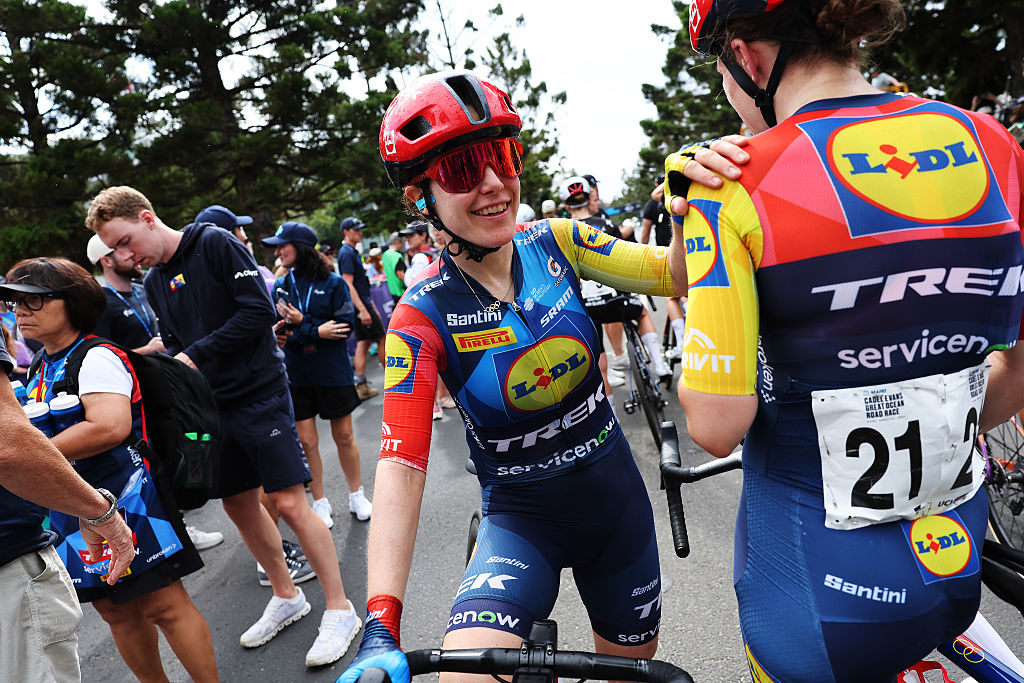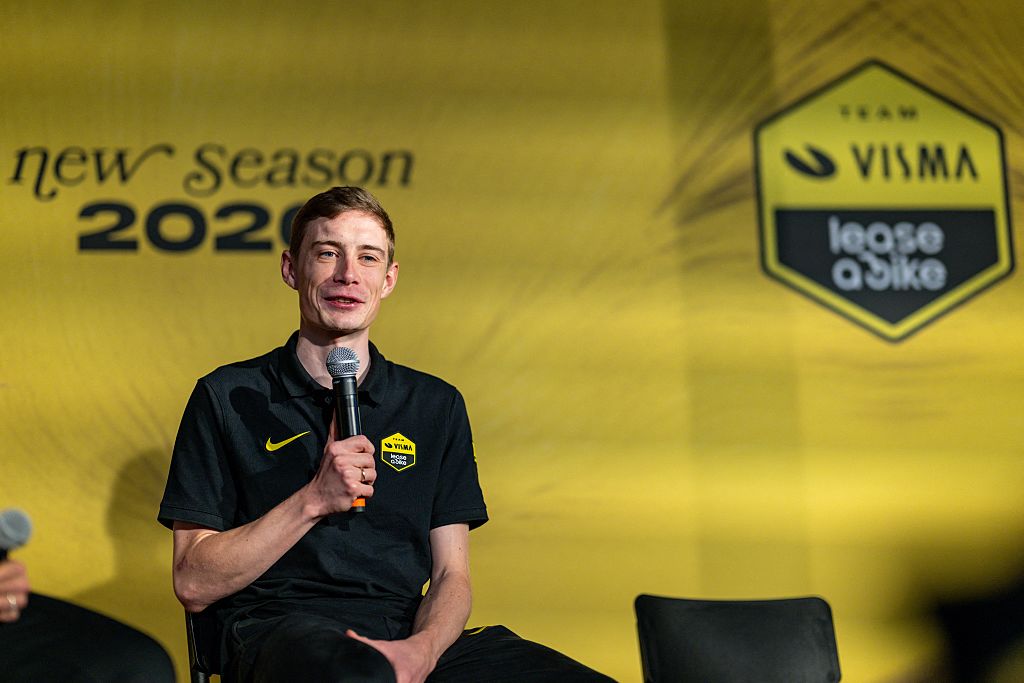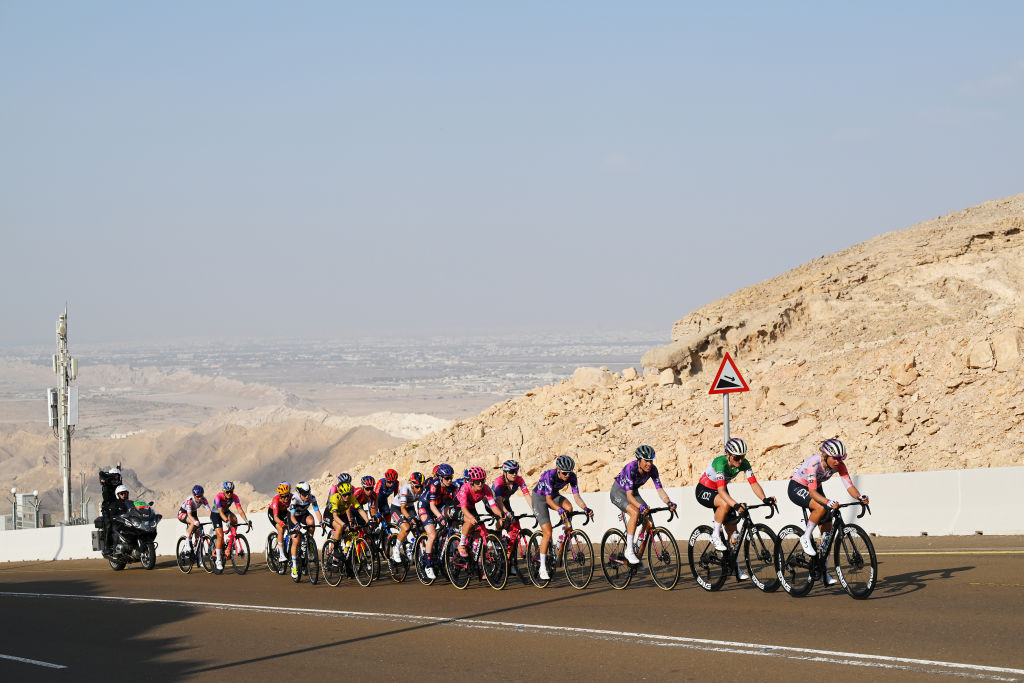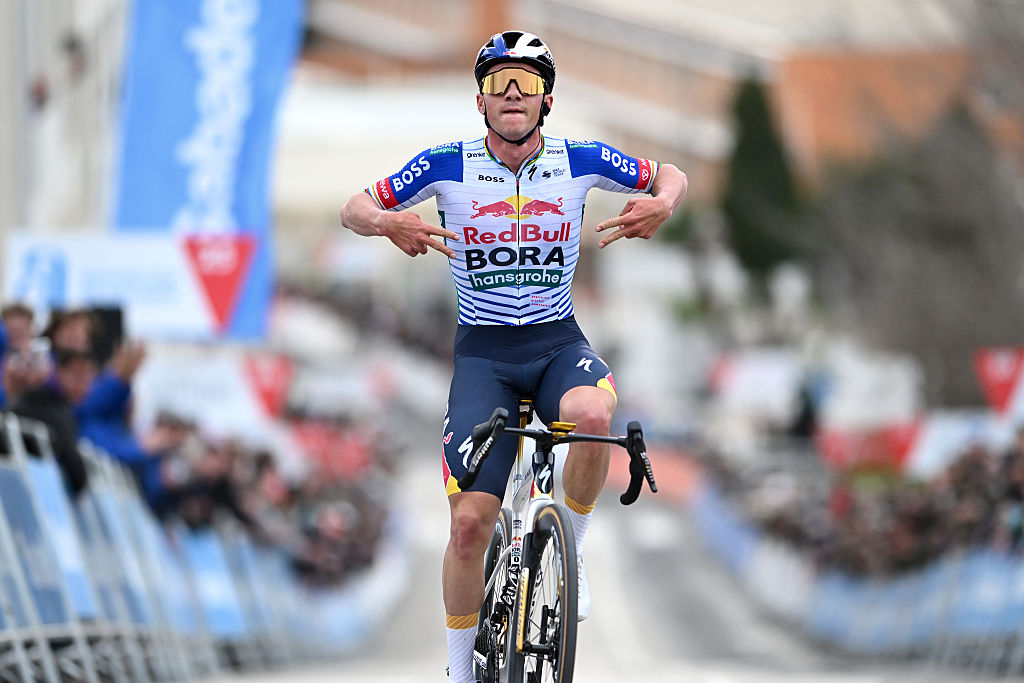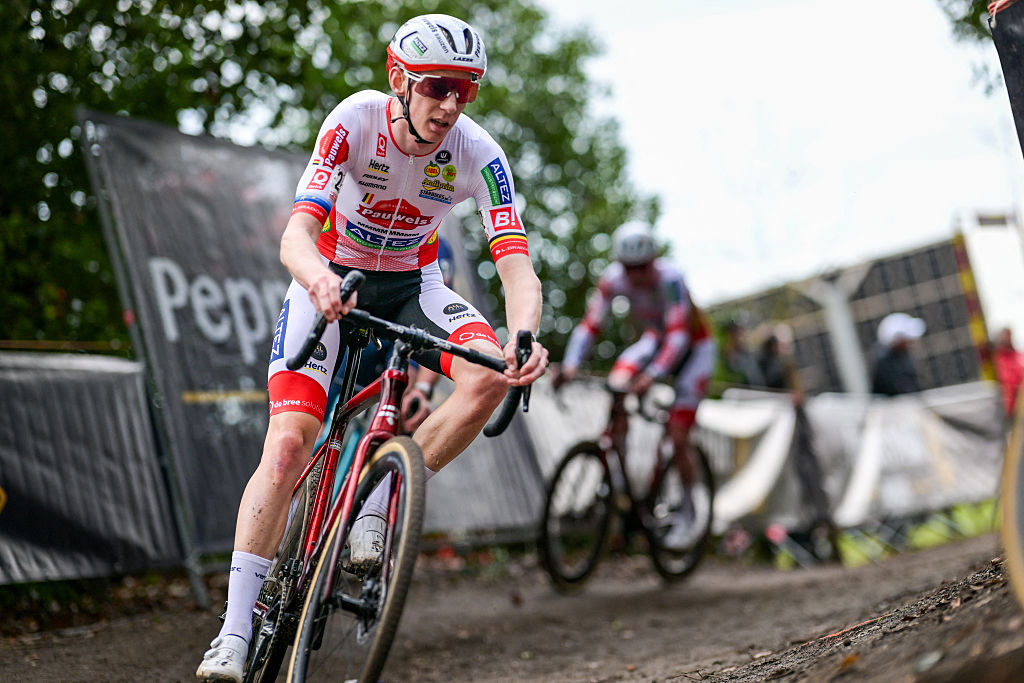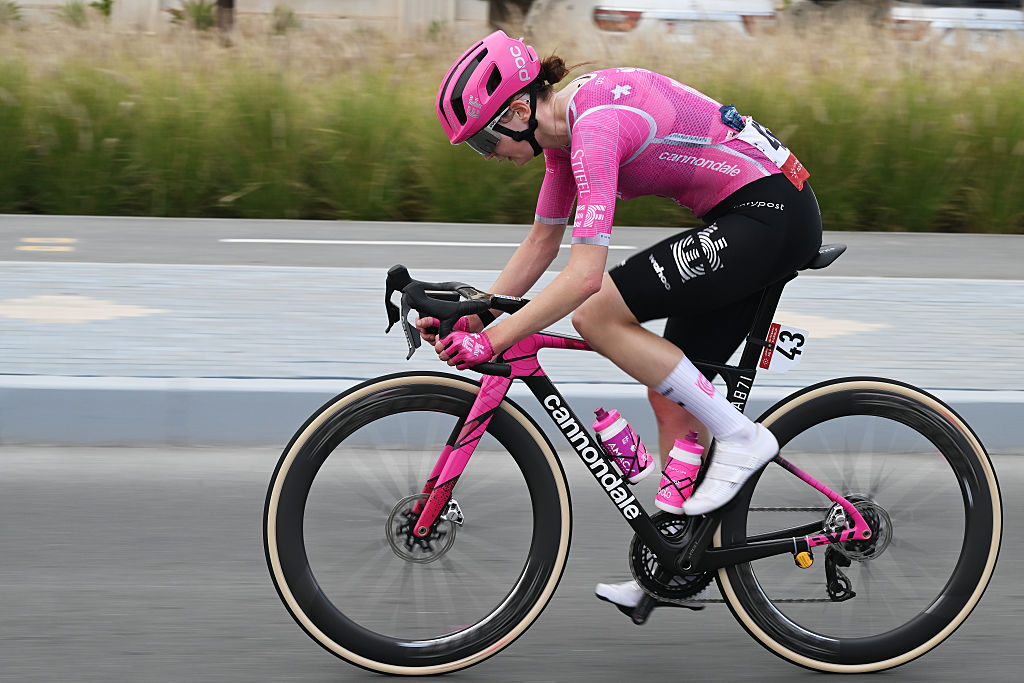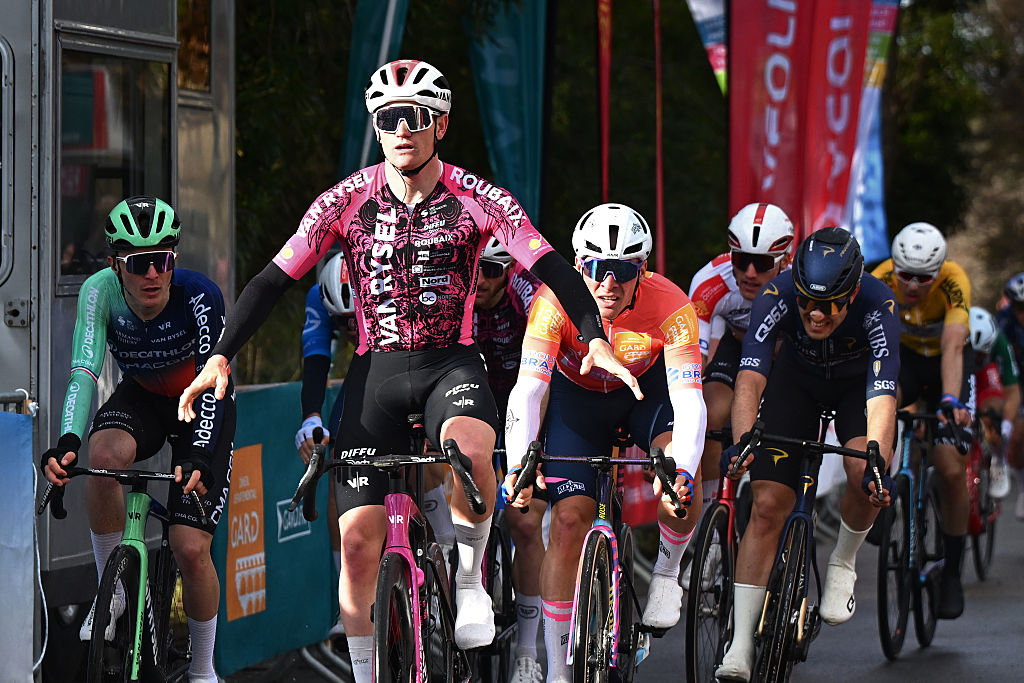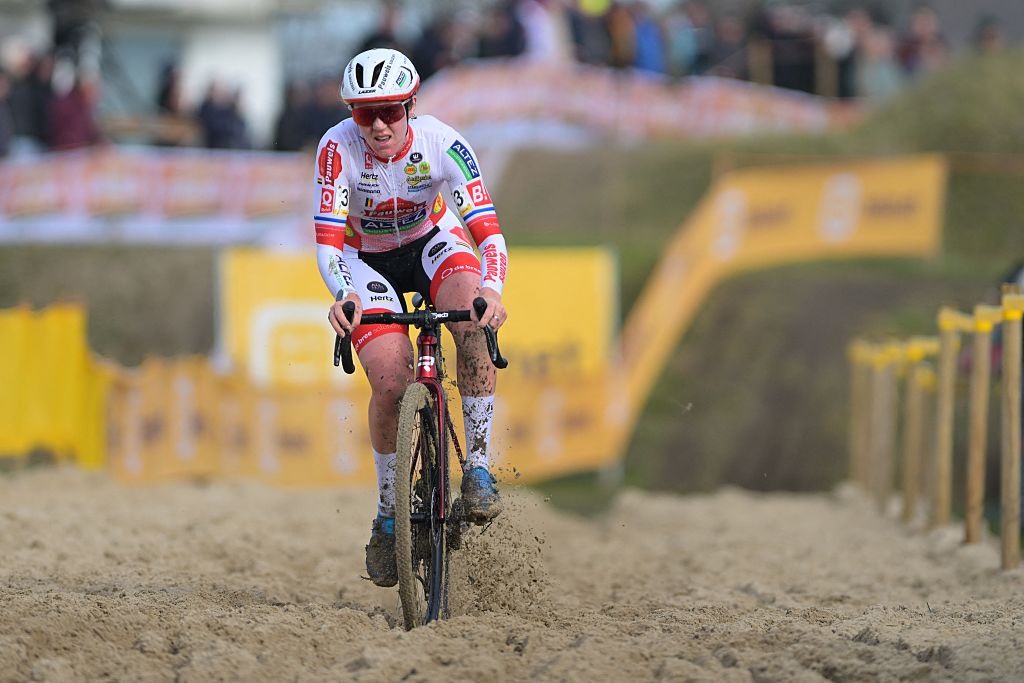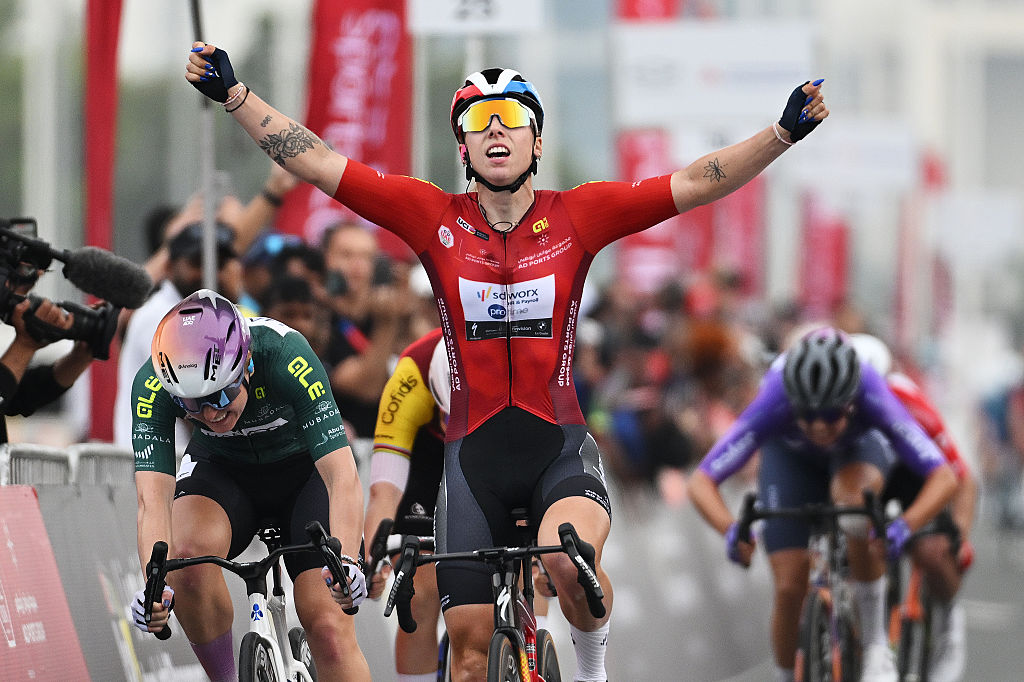Lance Armstrong Oprah Interview 2013: Part I
January 1 - January 18, Austin, Texas, Austin, Texas, Road - [none]
Welcome to Cyclingnews' live coverage of the Lance Armstrong Oprah Interview. We are 30 minutes from the start of what is promised to be one of the most-watched interviews of the year. Join us as we lead into the highly-anticipated interview with live coverage of the show to begin at 900pm EST.
Welcome to Cyclingnews’ most unconventional live coverage as we “live blog” along to the Lance Armstrong interview with Oprah Winfrey. It is the first time that Armstrong will speak publicly since being banned for life from all competitions that fall under the World Anti-Doping Agency’s purview.
It is the interview of the century, but one has to look past the drama, the drinking parties, the keyword bingo and realize the historical significance of this moment: the possibility that one of cycling’s most successful athletes will admit that he cheated his way to the top will be historic in and of itself. But to have Lance Armstrong finally change his tune after more than a decade of denials will be a true turnabout.
Why now? What does he have to gain? How will he redeem himself? Those questions and more will be asked, but how well he can answer will determine whether or not Armstrong can improve the public’s perception of him.
Join in the conversation on Twitter by using the hashtag #doprah
If you find yourselves in need of a bit of history, you can find Cyclingnews' index of all the Armstrong doping stories from 1999 on here.
Looking for some background information before the show starts? Here's Cyclingnews' index of Lance Armstrong's doping allegations over the years
The real question of the day is: can the OWN servers handle the demand for online streaming? Luckily our man Peter Hymas has cable television as a back up.
RT @Kiss_my_Panache: I'm not sure Oprah's servers will be able handle the load.... load of BS that is.. #doprah
@mewmewmew13 Fri, 18th Jan 2013 01:57:46
While we count down the seconds to the interview, let's look back at Armstrong's career and the doping allegations that haunted him from his first Tour.
Armstrong successfully fought off allegations of doping, which began from his first unlikely Tour de France victory in 1999 and continued on into his retirement in 2005.
The first inkling came when L’Equipe caught wind of a “non-negative” doping control for cortisone returned by Armstrong. Cortisone was and is allowed in competition with a Therapeutic Use Exemption, but that needs to be presented prior to the race by the rider and his team. The problem was, Armstrong didn’t have a TUE until his team allegedly created a backdated prescription from the team doctor, which the UCI accepted. The legend was born.
We have Procycling's European Editor Daniel Friebe here: he says "Lance has always been a compelling talker. Whatever he says, I expect this to be riveting."
Wow, Oprah doesn't waste time - she launches right into asking him did he dope? Yes. EPO? Yes. Blood transfusions? Yes. In all 7 Tours, did you dope? Yes.
When did you first start doping? In my early career it was cortisone, and then the EPO generation began - he says, mid-1990s.
"It's too late for probably most people, and thtat's my fault. I viewed this situation as one big lie that I repeated a lot of times"
Mark Fabiani would be proud. Armstrong is taking responsibility for the lies.
Daniel Friebe: "Like I said, this is compelling, but will be hard for Lance to convince people that he's not reading from the perfect script."
Armstrong says he lost himself in the story - the perfect story. He was used to controlling every outcome in his life. But now the story is "so bad, it's so toxic".
Lance says he didn't create the doping culture but he did nothing to stop it, and for that he is sorry.
You may not have invented the culture but you were one of the head cheerleaders #Doprah #LanceArmstrong
@couchmusings Fri, 18th Jan 2013 02:07:29
Now, he denies it was the most sophisticated doping scheme in all of sport. He says it was conservative, risk-averse.
Armstrong refuses to accuse anyone else specifically in the peloton of also doping.
Some quotes so far:
"The sport is now paying the price and I'm sorry for that"
"Why now? That’s the best question, that’s the most logical question. I don’t know that I have a great answer. I will start my answer by saying that this is too late. It’s too late for probably most people and that’s my problem. I view this situation as one big lie that I repeated a lot it times."
Lance Armstrong says his team's doping program wasn't as bad as the East German state-sponsored program in the 1980s
@ReedAlbergotti Fri, 18th Jan 2013 02:09:37
Even the New York TImes is fact-checking this interview.
Moto-man dropping off EPO? True.
Lance says he did not read Tyler Hamilton's book.
Oprah asks, how did the doping all work? Armstrong explains oxygen-vector doping and how it helps in endurance sports. "That's all you needed. My cocktail was only EPO, not a lot, transfusions and testosterone"
Armstrong justifies the use of testosterone considering his history, he is "lacking" after having one testicle removed due to cancer.
Everybody drink: We have are first cancer excuse. #LanceArmstrong #Doprah
@kwilson9austin Fri, 18th Jan 2013 02:15:10
After getting away with it for years, Armstrong says Two things changed: the shift to out of commpetition testing and the biological passport"
Armstrong said he was only upset when USADA says he doped during his comeback. He said that is not true, the last time he "crossed that line" was in 2005.
Time for a commercial, and time to get caught up on everything Armstrong just said! He has admitted to doping up until 2005 and confirmed many of the things alleged by Tyler Hamilton and Floyd Landis... and David Walsh and others.
He would not single out any individuals who were doping in the peloton, just as he would not single out any individuals for apologies - he only said he was sorry for not changing the culture of doping.
RT @iiagdtr: RT @chrisolds2009: Can we get Sheryl Crow's "My Favorite Mistake" playing low? #doprah
@Jennrunns Fri, 18th Jan 2013 02:20:41
Before the break, Oprah seemed to suggest she doesn't believe Armstrong was clean in 2009 in his comeback. "Are we talking semantics here?"
Lance denies having anyone fired because they refused to dope. That isn't exactly what Frankie Andreu might say. "It was a competitive time, we were all grown men, we made our choices. There were people on the team who chose not to".
Armstrong denies Vande Velde's assertions to the contrary. "There was a level of expectation - we expected guys to be fit, strong, to perform".
"I'm not the most believable guy right now, but I did not do that".
Semantics comment from Oprah was in regards to directing riders to dope or get fired: Armstrong said he led by example, but there was no directive.
Fabiani points: Armstrong accepts responsibility for leading by example. Throws it back to Vande Velde, saying he continued doping after leaving US postal.
Was I a bully? Yes - says Armstrong. He admits to going on the attack his entire life. "We grew up as fighters - I was a fighter, my mom was, still is a fighter. Before my diagnosis I said I would do anything I have to to survive. I took that attitude, that ruthlessness ... right into cycling. And that's bad."
Armstrong says inability to control his situation turned him into a bully, first with cancer, next with this case.
RT @betterbuilt: @metromorning He ruined people’s careers and livelihoods, to perpetrate his lie. He is no better than Madoff. #Doprah
@BanksyN Fri, 18th Jan 2013 02:28:17
Lance is splitting hairs here and they are getting mighty thin #doprah
@stkennedy Fri, 18th Jan 2013 02:28:09
Another commercial break, and more great analysis happening out on Twitter: Armstrong's repeated denials of blood doping in his return in 2009 means he is still trying to push that statute of limitations back. He insists he last doped in 2005.
Armstrong denies offering drugs to teammates.
So when Lance says he isn't in the business of calling people liars anymore & then he calls @ChristianVDV a liar, that must be just a hobby.
@CyclismasEditor Fri, 18th Jan 2013 02:31:22
Daniel Friebe says "On Lance's general body language and demeanour, I'd say that he's definitely emotional - or emotionally dazed - even if he's not in floods of tears."
Ferrari still the good doctor it appears #Doprah at least Oprah can say his name unlike lance.
@cyclistmetadata Fri, 18th Jan 2013 02:34:42
Daniel Friebe: "I think Oprah was right about this: it's semantics. You don't have to threaten people directly to exert pressure on them."
Armstrong does not want to talk about Ferrari. He's "Not comfortable talking about other people".
Armstrong says his doping period was "reckless". Admits to being both a "jerk" and an activist for his foundation, says he is "deeply flawed". Admits his actions, his defiance and his words magnified the situation.
Fabiani points!
Armstrong says doping was "like saying we have to have air in our tyres or water in our bottles. It was part of the job" #PAOprah
@mattmcgeehan Fri, 18th Jan 2013 02:37:05
Back to the statute of limitations - is Armstrong trying to hedge, hoping he can get a reduced ban? He would have to offer up something to USADA that's useful, but according to the Wall Street Journal, Travis Tygart shut that door.
Peter Hymas points out: "Interesting that what he originally characterized as "conservative and risk averse" regarding his doping regimen he later considered "reckless""
This is the interviewee that says, "My biggest flaw is working too hard."
@nyvelocity Fri, 18th Jan 2013 02:40:42
Now Oprah plays the quote on "cynics and skeptics" who "don't believe in miracles" from his final Tour de France pre-comeback.
"I've made some mistakes in my life, and that's one..."
Oprah: were you addressing the people who came out against you?
"That was the first time they gave the mic to the Tour winner, so I didn't have any time to [plan it]"
Oprah: Do you feel embarrassed?
"I definitely feel embarrassed. ... [I thought] You can leave with better than that, Lance. That was lame"
The RaceRadio points out that Armstrong actually asked for the microphone to speak that day of his last Tour win.
Oprah: Did you feel that you were cheating when you were taking banned drugs?
Lance: No. I looked up the definition of "cheat". I didn't view it that way. I viewed it as a level playing field.
At the same time Armstrong was saying "no" he didn't feel he was cheating, he was nodding his head yes.
More Fabiani points: Armstrong acknowledges people are angry, that they believed in him and "have every right to feel betrayed". "I will spend the rest of my life trying to earn back trust and apologize to people".
No, Lance. The definition of a cheat is to break the rules. Quaint idea, I know. #AskLance
@lioneljbirnie Fri, 18th Jan 2013 02:49:30
Unbelievable RT @JamezBlak: #Dumbfounded. RT @FaraiToday: "I did not understand the magnitude of that following" - Lance Armstrong #OWNTV
@FaraiToday Fri, 18th Jan 2013 02:52:16
Armstrong says he will apologize for the rest of his life: let's see in the next segment if he will "feel comfortable" talking about specific individuals - perhaps David Walsh, Betsy Andreu, Emma O'Reilly, Filippo Simeoni?
The full quote: "I didn’t understand the magnitude of that following. The important thing is that I’m beginning to understand that. I see the anger in people. Betrayal, it’s all there. These are people that supported me, believed in me and they have every right to feel betrayed... I’ll apologise to these people for the rest of my life."
Damien Ressiot must feel vindicated that Armstrong now admits he failed those 1999 EPO tests that were done retroactively.
Tour de Suisse - did you test positive?
"That story isn't true. There was no positive test. There was no paying off the lab, there was no secret meeting with the lab director.
The UCI did not make that go away?
"That did not happen".
When asked if he paid the UCI to make a positive go away, he said "This is impossible for me to answer this question and have anyone believe that. I am not a fan of the UCI... were there things that were a little shady? That was not one. I was retired, I had money - they asked would you consider a donation? I said sure."
Armstrong says the back-dating the TUE for cortisone in 1999 was true. He says he has to apologize to Emma O'Reilly, that she was one of the people who "got bullied". Not "I bullied her".
Armstrong says he reached out to O'Reilly to make amends. After the break, Oprah asks him if he reached out to Betsy Andreu.
Betsy Andreu gets her first mention. "it's a guy. He wanted...." talk about complete separation from his "previous" self. Man.
@UCI_Overlord Fri, 18th Jan 2013 03:01:37
"To be honest Oprah we sued so many people... I’m sure we did. But i have reached out to her and tried to make those amends on my own."
Armstrong is clearly struggling to admit to his deeds - he speaks of himself in the third person when dealing with the tough topics, but he says he is starting to come to terms with what he did.
I have lost total respect for Lance Armstrong with this Oprah interview. So insincere.
@carolinejoyce95 Fri, 18th Jan 2013 03:05:12
Alex Malone, our Australian production editor says, "It's a curious situation to expect people to believe what he is saying as truth when these other apprarent claims, by former teammates etc are all lies."
Daniel Friebe says: "We wouldn't be sitting here if I hadn't come back." - Looks as though Lance confirms what we've all said."
Armstrong says he called Betsy Andreu, she took his call. Was she telling the truth about the hospital? Armstrong will not reply. He asked Andreu to not talk about it, it was a personal, confidential conversation.
Have you made peace (with the Andreus)? No - they've been hurt too badly. A 40 minute conversation was not enough.
"I think she'd be OK with me saying this - 'i called you crazy, I called you a bitch, but I never called you fat'"
Lance Armstrong is one of the most despicable, vile, disgusting, inane, terrible men EVER
@SportsBizNews Fri, 18th Jan 2013 03:08:28
Daniel Friebe: "Beyond the purple shirt (!), there are lots of other parallels with the Tiger admission. There's clearly an effort to tackle some issues he has - even if it appears a little grudging in some cases - but most of us will feel that his future actions are going to speak louder than words. That's if anyone's paying any attention any more. One thing we're not really too much clearer on yet is what he hopes to achieve with this."
A lot of voices on Twitter are not positive toward Armstrong.
As Landis just proved, most people are crap at lying. LA wasn't most people.
@richardmoore73 Fri, 18th Jan 2013 03:11:22
Armstrong recalling being at Tour of California when Landis's emails came out detailing all the doping at US Postal, and by Armstrong.
Armstrong says he was supportive of Landis up until that point. Says he didn't give him a spot on the team, which wasn't entirely his decision. He wanted to keep Landis "on my team" - but says he did not shun him.
The comeback was also a tipping point. "We wouldn't be sitting here if I didn't come back".
"I just assumed the stories would continue for a long time... we’re sitting here because there was a two-year Federal investigation. Everybody involved in this story was called in. Subpoenaed, deposed. There was a man with a gun and the badge and the consequences are serious."
Wow lance armstrong. There's something so good about the truth coming out. Everyone feels better.
@BenVertonghen Fri, 18th Jan 2013 03:17:08
Any influence over closing of Fed. Investigation?
No. None. That’s very difficult to influence.
Truest thing Lance has said: It took subpoenas and feds to get to truth. Journalists alone could never have nailed him.
@gwenknapp Fri, 18th Jan 2013 03:20:24
I'm proud of you both too! RT @frenchb7: [Lyne Besette] so proud of my husband [Tim Johnson]for being true to his sport his whole career #cleancouple
@jessedanthony Fri, 18th Jan 2013 03:19:23
Alex Malone: His answer regarding Federal investigation is troubling. Armstrong may not have held any power over matter but considering it's "very difficult to influence" suggests that it could be.
Alex Malone: He is good at brushing over a question without sufficiently answering. It takes some serios probling from Oprah to get full details. He goes from using the term "we" didn't hire Floyd to saying decisions are not just up to him.
Peter Hymas: With Floyd it's still a case of semantics. Lance knows that if he wanted Floyd back on the team then with a wave of his hand it would be so. By saying "that's not necessarily my decision" and "the sport didn't want to take him back" is just passing the buck, especially for a self-proclaimed control freak.
Daniel Friebe: "I'd be the first man in the door [at a Truth & Reconciliation commission]." In fairness, he did offer disclaimers - "I have no credibility to say this" - but surely the best way for Lance to show his contrition now would be to keep a respectful distance from the sport. Some said his confession would help to "heal the sport". Not sure we've learned too much tonight that will bring the sport much comfort.
RT @TheRaceRadio: What Lance means is HE did not influence the DOJ.....that is what he pays lawyers $1,000 per hour for
@djconnel Fri, 18th Jan 2013 03:21:45
This would be so much better if #doprah interviewed @FakeFloydLandis and @lancearmstrong together
@RKilun Fri, 18th Jan 2013 03:23:15
Also I hope nobody is taking this #Doprah drinking game seriously, or that you called an ambulance ahead of time. http://t.co/TAAD5fVF
@KateReports Fri, 18th Jan 2013 03:25:20
To clarify, Floyd Landis didn't go to The @wsj. We dug up the emails and broke the story. Landis only talked after we went to press
@ReedAlbergotti Fri, 18th Jan 2013 03:25:29
Oprah: Will you cooperate with USADA to help them clean up cycling?
LA: I love cycling - I disrespected the rules ...that was my choice. I stand on no moral platform. If there was a 'truth and reconciliation' - I can't call to that, I have no cred. If I'm invited, I'll be the first man in the door.
Armstrong says he does not fault George Hincapie for coming forward. He says George is the most credible voice in all of this. "For the record, we're still great friends. We still talk once a week".
Lying man offers to be first on truth and reconciliation panel.
@nyvelocity Fri, 18th Jan 2013 03:29:15
... and with that, the interview ends until tomorrow, where we'll pick it back up with his Twitter photo of him lying under his seven yellow jerseys...
Armstrong's full comment on the truth and reconciliation:
"I love cycling. I really do. And I say that knowing that I sound like ... people will say that I’ve disrespected that event, the colour yellow, the sport, the jersey – I did.
"I disrespected the rules, regardless of what anybody says of the generation. That was my choice. If I can, and I stand on no moral platform here. It’s certainly not my place to say ‘hey guys, let’s clean up cycling.’ If there was a truth and reconciliation commission – again I can’t call for that. I’ve got no cred. But if they have it and I’m invited, I’ll be the first man in the door."
Daniel Friebe says: don't think the interview was a train wreck from his point of view, but it won't have changed too many people's minds either. Maybe the mainstream audience....
LW: Oprah sure didn't waste any time getting to the heart of the matter. For all the expectations that this might be a fluff interview, she touched on many of the points that cycling fans have been most upset about.
However, she missed a few key opportunities to try to get Armstrong to go on the record with an apology to specific people. He speaks of having apologized, he says he understands that his fans are upset with him, but he doesn't specifically come out and say "I'm sorry".
What was the most surprising thing to you? - Tweet to @laura_weislo
Alex Malone: That he didn't pay UCI to cover up a doping test and that it was (apparently) a request from UCI itself because they were broke.
Daniel Friebe: Admitting that he was a bully, saying he didn't feel like a cheat, categorically denying the meeting with the UCI - not surprising but significant
RT @jasonWSJ: Do yourself a favor tonight. Follow a U.S. pro cyclist on Twitter. Someone you've never heard of. Someone who races becaus ...
@ncalcyclingnews Fri, 18th Jan 2013 03:35:47
He didn't have the stones to say that Betsy wasn't lying. And she is so livid about it. #doprah
@CyclismasEditor Fri, 18th Jan 2013 03:34:40
Wishing that @howardstern was interviewing lance instead. Think he'd do a better job of cutting through the BS.
@gouldgeorgia Fri, 18th Jan 2013 03:35:22
Peter Hymas says most surprising was "That he just seemed to stop in his tracks regarding the hospital doping admission witnessed by the Andreus."
@laura_weislo What I find disconcerting were his coments about influencing the FED case - almost implied that they had tried.
@Climberruss Fri, 18th Jan 2013 03:39:38
With that we will leave our coverage until tomorrow, when the interview continues. Thanks all for reading.
Latest on Cyclingnews
-
'I do this sport because I love it' – Amanda Spratt still finding new adventures in retirement season and 20th year of racing in Europe
Despite her imminent retirement, the Australian remains last focused on racing in 2026 -
Season delays for Jonas Vingegaard, Wout van Aert 'not a disaster' says Visma-Lease a Bike head of racing
Vingegaard set to start 2026 season in late March at Volta a Catalunya -
'It's UAE's to lose' – What the GC favourites expect on Jebel Hafeet with UAE Tour Women overall win up for grabs
Can Elisa Longo Borghini defend her title? Who will be her closest challengers? We asked the contenders
-
Volta a la Comunitat Valenciana: Remco Evenepoel climbs into race lead and fifth victory of the year with another early-season display on stage 4
Belgian nets solo Queen stage victory ahead of João Almeida and teammate Giulio Pellizzari -
Superprestige Middelkerke: Michael Vanthourenhout returns to victory after missing Worlds
Vandeputte clinches series as Kuypers rounds out podium -
'You have to try something' to break Lorena Wiebes' sprint dominance, but EF Education-Oatly's efforts fall short at UAE Tour Women
Solo attacker Nina Berton had hoped for company in her stage 3 breakaway but insists you have to attack to beat Wiebes on flat stages
-
Étoile de Bessèges: Continental rider Joppe Heremans foils WorldTour riders to win stage 4
Kubiš keeps race lead with second on the stage ahead of Decathlon's Paul Lapeira -
Superprestige Middelkerke: Season's breakthrough rider Amandine Fouquenet takes final round as Van Alphen wins overall by tiny margin
Ceylin del Carmen Alvarado second, Marie Schreiber third in final round as Fouquenet and Van Alphen finish on equal points overall -
UAE Tour Women: Untouchable Lorena Wiebes powers to third straight victory but pushed close by rivals in hectic stage 3 finish
Lara Gillespie narrowly beaten into second, Amalie Dideriksen third in Abu Dhabi Breakwater, but no one can stop Wiebes from a 121st career victory





























